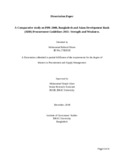A comparative study on PPR-2008, Bangladesh and Asian Development Bank (ADB) procurement guidelines 2015: strength and weakness

View/Open
Date
2018-12Publisher
BRAC UniversityAuthor
Hasan, Mohammad RabioulMetadata
Show full item recordAbstract
The ADB procurement guidelines 2015 and the PPR-2008 gives the proper guidance to the procurement
of goods, works and services as per legal framework within restrictive boundary for the parties involved
in procurement. This study mainly compares with an aim to find out the strengths and weaknesses of
ADB guidelines and PPR-2008 regarding public procurement in context of Bangladesh.
This comparison is done by reviewing the guidelines of ADB Guidelines 2015 and PPR-2008. In ADB
procurement guidelines, there are provisions of procurement planning, principles of procurement,
procurement processing, joint venture, methods of procurement, applicable law for settlement of disputes,
bid opening, evaluation and approval process, bid validity and bid security, domestic preferences,
community participation misconduct relating procurement and so on. The ADB procurement guidelines
are based ADB procurement policy framework which shall be ensures Core Procurement Principles such
as economy, efficiency, fairness, transparency, quality, value for money, integrity, accountability, and
addresses conflict of interest, noncompliance, and complaints.
The PPR 2008 delineates provisions of procurement plan, preparation of tender or proposal, committee,
principles of public procurement, tender validity and security, specifications, standard, brand names,
approval process, notification of award, contract administration and management, records and audit, joint
venture, conflict of interest, complaint and appeal procedure, methods of procurement for goods and
related services, works, physical services and their use, processing of procurement, professional
misconduct, e-Government procurement. The main spirit of PPR 2008 are transparency, accountability,
equity, fairness and open competition for ensuring value for money by using of public fund.
There are some strengths and weaknesses in some specific cases of guidelines as well. Strengths in ADB
procurement guidelines include performance based procurement, bonus for performance, community
based procurement, encouraging joint venture, procurement plan, pre-qualification, misprocurement,
misconduct, settlement of dispute and so on. Using the strengths of ADB procurement guidelines, the
borrower can achieve the speedy procurement, fairness competition, accountability and value for money.
The main weaknesses are absence of sustainable procurement, supply chain issues, whole life cycle
costing, and sustainability, strategic partnership with supplier and contractors, disposal policy and so on.
The guidance in the ADB guidelines and PPR-2008 conform to some aspects and differ in others.
Because of weaknesses in both guidelines and rules, sustainability and social aspects are compromised in
public procurement which hampers long-term value for money. This study emphasizes improvement of
regulatory framework by fostering strengths of both guidelines and rules in context of Bangladesh.
